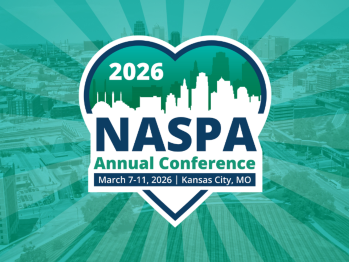
September 3, 2025
Main Program Submissions & Reviewer Sign-ups due
October 1, 2025
Housing opens
December 17, 2025
Early Registration closes
2026 NASPA Annual Conference
March 7 - March 11, 2026 Kansas City, MO
The NASPA Annual Conference is the premier student affairs professional development event.
With over 6,500 participants and exhibitors, the 2025 NASPA Annual Conference was a success! The 2026 NASPA Annual Conference is already shaping up to be another memorable gathering. We hope to see you in Kansas City for our 108th annual meeting to connect with colleagues and participate in critical professional development that will inspire and support you in the work you do on campus.
Presented By
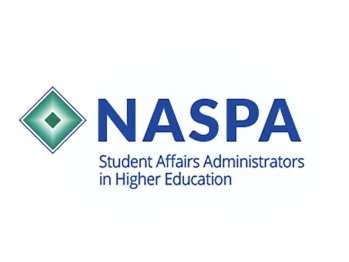
Registration
| Advance 5/1/25–6/30/25 | Early 7/1/25–12/17/25 | Regular 12/18/25–2/4/26 | Late/Onsite 2/5/26–3/1/26 | |
|---|---|---|---|---|
| NASPA Member | $535.00 | $595.00 | $655.00 | $725.00 |
| Non-member | $735.00 | $795.00 | $855.00 | $925.00 |
| Emeritus | $315.00 | $355.00 | $395.00 | $445.00 |
| Graduate Student | $200.00 | $240.00 | $280.00 | $330.00 |
| NUFP, Undergraduate | $140.00 | $160.00 | $180.00 | $210.00 |
Registration Cancellation Policy
To cancel a registration and request a refund, a written request must be sent to customer service. Cancellation requests will not be processed over the phone.
Cancellation Refund Request Deadlines
• Refund requests received by January 14, 2026 will receive a full refund of your order, less a $50 service and processing fee. Please note, orders include all registration fees paid, including the main conference, pre-conference workshops, and any other ancillary events.
• Refund requests received between January 15, 2026 and February 4, 2026 will receive a refund equal to 50% of your order.
• Refund requests received after February 5, 2026 are not eligible for a refund.
• Exceptions to the cancellation refund policy outlined above will be considered on a case-by-case basis and decisions will be made approximately 15 business days after the conclusion of the conference.
• Attendee substitutions are permitted. Substitutions should be the same member classification so that the payment is an even exchange transfer of payment. Please submit the substitution request to customer service and provide all contact information including title, email address and NASPA ID#. Non-members stepping in as a substitution must have a NASPA profile and NASPA ID#. Please click here to create a NASPA profile.
Exceptions to the cancellation refund policy outlined above will be considered on a case-by-case basis and decisions will be made within two weeks after the conclusion of the conference.
Credit Card Refund Process
Eligible credit card refunds will be processed within 72 business hours after receipt. For eligible check refunds, please allow 15 business days for processing. After February 6, 2026, all check refunds will be processed approximately 15 business days following the 2026 NASPA Annual Conference.
2026 Conference Focus Areas
Elevating Student Affairs: Embracing Our Impact
Student affairs educators must leverage technology and data, in addition to understanding the return on investment (ROI) in our work, to elevate the profession, ensure outcomes are data-informed, and drive change that centers student success.
-
Redefining the Profession:
-
What should be the focus of a changed student affairs profession to meet modern needs?
-
How can we align our goals with leadership, faculty, and staff to impact student success?
-
Leveraging Data and Technology:
-
How can we better integrate data analytics, ensure equitable access to resources, and foster post-graduate success?
-
How can technology assist with demonstrating student affairs ROI to boards, legislators, and other stakeholders?
-
How can student affairs educators and faculty stay ahead of trends in technology and workforce needs to better prepare students for future employment?
-
Operational Excellence in Student Affairs:
-
What best practices from the business world can enhance student affairs operations?
-
How do concepts like ROI and value proposition translate to student engagement
-
Navigating Workforce and Economic Trends:
-
How should student affairs adapt to evolving student needs, workforce demands, and the mental health climate?
-
How are we preparing students for employment in critical areas of the economy?
-
The Future of Work in Student Affairs:
-
How can flexibility in work arrangements (e.g., remote work) impact the future of the profession?
-
How do we ensure that staff well-being aligns with student well-being for overall success?
Focusing on People: The Heart of the Student Affairs Profession
Student affairs is more than a profession - it is a career shaped by individuals from diverse backgrounds who bring unique perspectives at every stage of their journey. From entry-level professionals to faculty to senior-level practitioners, each contributes to the field's evolving identity. Equally important is celebrating the often-unsung contributions of middle managers—our directors and supervisors—who shape the future of student affairs through mentorship and innovation.
-
Understanding Entry-level Professionals:
-
What are the expectations of new professionals entering the field?
-
How do the ways various generations prefer to be supervised impact their view of the profession?
-
Supervision Beyond Personality Assessments:
-
How do we honor the contributions of those who lead, mentor, and volunteer to advance student affairs?
-
How can supervision evolve to better understand and support the diverse needs of staff at various levels, backgrounds, and experiences?
-
Celebrating Leadership and Evidence-based Practices:
-
How do we recognize and honor the work of middle managers who drive innovation and student-centered practices?
-
Restoring Purpose and Sustained Joy in the Work:
-
How do we build a culture that fosters joy, innovation, and leadership, while adapting to new expectations in work and supervision?
-
How can professionals reconnect with the purpose of student affairs, finding fulfillment and joy in their roles?
-
Tools for Professional Growth:
-
What innovative tools, AI, or other skills are professionals using that have enhanced their work?
Pathways to Student Success: Thriving in Higher Education
As the landscape of higher education evolves, institutions are tasked with fostering student success amidst complex challenges. Student affairs professionals play a critical role in navigating crises, mental health needs, student goals, and institutional priorities, all while supporting the staff who are essential to student success. This focus area invites participants to think critically about the principles guiding this work, from grant funding and public-private partnerships to breaking down systemic barriers and supporting the diverse, often under-discussed identities that shape student experiences.
-
Supporting Students and Staff:
-
How do we support staff in managing the mental health and JEDI challenges that arise as they foster student success?
-
How do we balance the institution's goals with the personal goals of our students?
-
Barriers to Success:
-
What are innovative and inventive ways to reduce barriers (e.g., housing, healthcare, basic needs) through partnerships and funding?
-
How can we ensure that student affairs work transcends "event management" and focuses on systemic change?
-
Lifelong Learning for Professionals:
-
How do we foster lifelong learning for staff through formal and informal avenues?
-
How do we, as professionals, continue to thrive while supporting students' success?
-
Diversifying the Student Affairs Pipeline:
-
How can we diversify pathways into student affairs to support generational wealth and expand career opportunities?
-
How do we help the next generation of student affairs professionals understand the breadth of roles (e.g., marketing, research)?
-
Exploring Unique Identities Connected to Success:
-
How do we address the needs of students with complex identities—second-generation, multiracial, and international students navigating unfamiliar systems?
-
How can we create spaces that encourage thriving for underrepresented identities often left out of traditional student success discussions?
Call for Programs
The #NASPA26 Call for Programs and Reviewers is open!
The Conference Leadership Committee invites program proposals that address the myriad challenges and opportunities we face, from creative budget solutions and utilizing technology, to building morale, and sustaining the workforce. NASPA is also seeking reviewers to evaluate submissions. Consider contributing your experience and expertise to #NASPA26 by submitting a program, signing up to be a reviewer, or both!
Key Submission Due Dates
All deadlines are at 11:59pm Pacific Time unless otherwise noted.
-
July 16: Pre-conference Workshop Submissions and Reviewer Sign-ups Due (Now Closed)
-
September 3: Main Program Submissions and Reviewer Sign-ups Due
-
October 1: Meeting/Reception Requests due
Main Call for Programs and Reviewers
Main Call for Programs and Reviewers
Start your proposal now for a general interest session, poster session, Scholarly Paper, or SA Series, and consider contributing your experience and expertise as a program reviewer!
Main Submission Timeline
-
September 3: Call for Programs Closes
-
Early November: Decision Notifications
Main Program Review Timeline
-
September 3: Reviewer Sign-up Closes
-
September 10: Assignments Emailed
-
September 10-25: Review Period
-
September 24: Program Reviews Due
Submission Process and Contact Information
Submission Process
Incomplete proposals may be edited as many times as you wish until the submission deadline. Click Save and Submit on the final page of the submission form to complete your proposal. Please note that edit access is removed after you click Save and Submit.
Incomplete submissions will not move on to the review process. A submission is considered "complete" when responses have been entered in all sections of the submission form, and you have clicked Save and Submit. You will receive a confirmation email when you have completed this step.
Contact Us
If you have any questions or need assistance with your submission, please email ACprograms@naspa.org. To ensure you receive all email communications about your submissions, please add ACprograms@naspa.org, naspa@naspa.org, and conference@naspa.org to your safe senders list.
Register Online for 2026 NASPA Annual Conference
Meeting and Reception Requests
The NASPA Annual Conference is an opportunity for NASPA Constituent Groups and institutions to host events. Submit a meeting/reception request to plan a gathering for your community at #NASPA26 in Kansas City.
Meeting and Reception Request Timeline
- October 1: Meeting/Reception Requests Due
- Early November: Meeting/Reception Confirmations
- Mid-November: Catering/AV Order Process Opens
- December 10: Catering/AV Orders Due
Session Types
The 2026 NASPA Annual Conference features multiple session formats to share your research, best practices, knowledge, and expertise. Choose one of the formats below before starting your proposal:

General Interest Sessions
General Interest Sessions are traditional program sessions that last for 50 minutes. They are designed to be interactive conversations between presenters and participants and allow attendees to grow skills and competencies.
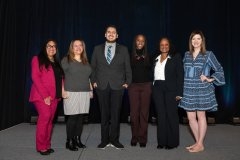
SA Series: SA Speaks and SA Stories
Your story is unique, and now is the time to tell it! The SA Series provides presenters with the opportunity to bring inspiring and energetic narratives to the stage. SA Series proposals include a short video showcasing the presenter speaking about their topic.
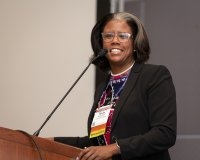
Scholarly Paper Sessions
These sessions give presenters the opportunity to share innovative findings and conceptual arguments in the form of Scholarly Papers. Each 50-minute session will feature two authors who will present their papers, followed by comments from the discussant and a facilitated question and answer session.
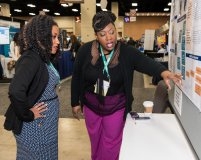
Poster Sessions
Poster Sessions are designed to be impactful information sessions on research and institutional programs. During dedicated poster session time blocks in the conference schedule, presenters will be available at their posters to discuss their research and programs. Attendees can use this one-on-one time with presenters to learn more, ask questions, and talk through implications for their own campuses. Posters will also be available to view throughout the conference.
Housing
Below is a list of hotels and pricing that will be available when housing opens October 1.
| Hotel Name | Address | Room Rate |
|---|---|---|
| Kansas City Marriott Downtown* | 200 West 12th St, Kansas City, MO 64105 | $236.00 |
| Loews Kansas City Hotel* | 1515 Wyandotte St, Kansas City, MO 64108 | $242.00 |
| AC Hotel Kansas City Downtown* | 906 Grand Blvd, Kansas City, MO 64106 | $229.00 |
| Courtyard Kansas City Downtown/Convention Center | 1535 Baltimore Ave, Kansas City, MO 64108 | $229.00 |
| Crowne Plaza Kansas City Downtown | 1301 Wyandotte St, Kansas City, MO 64105 | $199.00 |
| Hampton Inn and Suites Kansas City Downtown Crossroads | 1571 Main St, Kansas City, MO 64108 | $159.00 |
| Hilton Kansas City Country Club Plaza | 770 West 47th St, Kansas City, MO 64105 | $199.00 |
| Hilton President Kansas City | 1329 Baltimore Ave, Kansas City, MO 64105 | $214.00 |
| Holiday Inn Express Kansas City Downtown | 417 East 13th St, Kansas City, MO 64106 | $199.00 |
| Hotel Indigo Kansas City Downtown | 101 West 11th St, Kansas City, MO 64105 | $239.00 |
| Hotel Indigo Kansas City The Crossroads | 2020 Grand Blvd, Kansas City, MO 64108 | $189.00 |
| Hotel Kansas City | 1228 Baltimore Ave, Kansas City, MO 64105 | $239.00 |
| Hotel Phillips Kansas City, Curio Collection by Hilton | 106 West 12th St, Kansas City, MO 64105 | $239.00 |
| Hotel Savoy Kansas City, Tapestry Collection by Hilton | 219 West 9th St, Kansas City, MO 64105 | $229.00 |
| InterContinental Kansas City at the Plaza | 401 Ward Pkwy, Kansas City, MO 64112 | $189.00 |
| Kansas City Marriott Country Club Plaza | 4445 Main St, Kansas City, MO 64111 | $199.00 |
| Residence Inn Kansas City Downtown/Convention Center | 1535 Baltimore Ave, Kansas City, MO 64108 | $249.00 |
| Sheraton Kansas City Hotel at Crown Center | 2345 McGee St, Kansas City, MO 64108 | $229.00 |
| The Fontaine Hotel | 901 West 48th Pl, Kansas City, MO 64112 | $194.00 |
| Westin Kansas City at Crown Center | 1 East Pershing Rd, Kansas City, MO 64108 | $249.00 |
#NASPA27 CLC Subcommittee Process
The 2027 CLC is looking for individuals willing to serve on the following committees: Signature Learning & SA Voices Session, Faculty Initiatives & Scholarly Papers, Career Stage Programming, Attendee Engagement & Experience, and National Harbor/DC Experience.
Now is your chance to apply to join the subcommittees who build an experience for attendees unlike any other student affairs conference in the world. #NASPA27 will be held March 6 - 10, 2027 in the National Harbor, MD. There are a myriad of leadership opportunities to assist with the NASPA Annual Conference.
Please consider applying today!
Application closes May 15, 2026
Subcommittee Decision Notification: Rolling